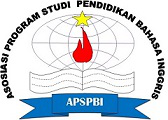Decolonizing The Learning Process In The English Language Education Study Program
Abstract
Keywords
Full Text:
PDFReferences
Beres, A. M. (2015). An overview of translanguaging: 20 years of ‘giving voice to those who do not speak.’ Translation and Translanguaging in Multilingual Contexts, 1(1), pp 103–118.
Fandiño-Parra, Y. J. 2021. Decolonizing English language teaching in Colombia: Epistemological perspectives and discursive alternatives. Colombian Applied Linguistics Journal, 23(2), pp 166-181.
Hsu, F. 2017. Resisting the Coloniality of English: A Research Review of Strategies. The CATESOL Journal, 29 (1). pp 111-132.
Kampittayakul, T. (2018). The role of Translanguaging in Improving Thai Learners’ Interactional Competence in Dyadic English as a Foreign Language Tutorial Sessions. PASAA, 56(JulyDecember), pp 80–111.
Motlhaka, H. A., & Makalela, L. 2016. Translanguaging in an academic writing class: Implications for a dialogic pedagogy. Southern African Linguistics and Applied Language Studies, 34(3), pp 251–260.
Nagy, T. (2018). On translanguaging and its role in foreign language teaching. Acta Universitatis Sapientiae, Philologica, 10(2), pp 41–53.
Putrawan, G.E. 2022. Translanguaging Practices in EFL Classrooms: Evidence From Indonesia. CaLLs, 8 (1), pp 69 – 86.
Rajendram, S. 2022. Our country has gained independence, but we haven’t”: Collaborative translanguaging to decolonize English language teaching. Annual Review of Applied Linguistics, 42, pp 78–86.
Rodrigues, W., Albuquerque, F. E., & Miller, M. 2019. Decolonizing English language teaching for Brazilian Indigenous peoples. Educação & Realidade, 44, e81725.
Romanowski, P. (2019). Translanguaging in the Polish educational context: Lessons learnt from IB schools. Bellaterra Journal of Teaching and Learning Language and Literature, 12(1), pp 5– 24.
Salas, C. M. V. 2022. Decolonizing Foreign Language Education: The Misteaching of English and Other Colonial Languages. International Journal of Literacy, Culture, and Language Education, 3, pp 81-84.
Sengupta, A. 2022. Decolonizing the Classroom: Reflections on English Language Teaching in the Non-Native Context. Research Approaches in Multidisciplinary Subjects, 2(1), pp 42-47.
Skutt, N. 2016. Using translanguaging to decolonize English language teaching in Colombia: A narrative inquiry. Íkala, Revista de Lenguaje y Cultura, 21(2), pp 281-302.
Skutna, L., & Menck, L. (2019). Decolonizing multilingual pedagogies. https://www.researchgate.net/publication/342366043_Decolonizing_English_a_proposal_for_implementing_alternative_ways_of_knowing_and_being_in_education
Wei, L., & Garcia, O. 2022. Not a First Language but One Repertoire: Translanguaging as a Decolonizing Project. RELC Journal, 53(2), pp 313–324.
Wang, S. 2020, September 21. Translanguaging and decolonising English language teaching. The Linguist List. https://www.researchgate.net/publication/341931265_ Translanguaging_and_Task_Based_Language_Teaching_Crossovers_and_Challenge
DOI: http://dx.doi.org/10.20527/jetall.v7i2.20802
Article Metrics
Abstract view : 41 timesPDF - 26 times
Refbacks
- There are currently no refbacks.
This journal is indexed in:


This Journal is listed in:
 Journal of English Teaching, Applied Linguistics and Literatures (JETALL)
Journal of English Teaching, Applied Linguistics and Literatures (JETALL)








.png)



1.png)
